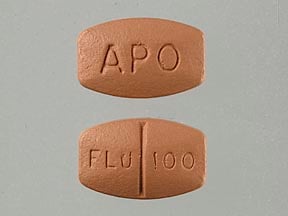
Fluvoxamine Coupons & Savings Card – Discount Prices from $30.93
Fluvoxamine is a medication primarily prescribed for the treatment of obsessive-compulsive disorder (OCD) in adults and children aged 8 and older. As a selective serotonin reuptake inhibitor (SSRI), Fluvoxamine functions by enhancing serotonin levels in the brain, which can help alleviate OCD symptoms. It is typically administered orally, either once or twice daily, depending on the prescribed form—either immediate-release tablets or extended-release capsules. While effective, some users may experience side effects such as nausea, sleep disturbances, and headaches. Always consult with a healthcare professional before starting any new medication or treatment plan.
Our coupons are free to use. Before paying, show the pharmacist your Fluvoxamine savings card to get your free discount. Use our filters below to edit the prescription box to match your needs. The Fluvoxamine prices will update based on your prescription needs. Above our Fluvoxamine coupons, you can change your location to see pharmacy prices and costs in other areas. We're here to help you buy Fluvoxamine at the lowest price with our prescription discount card.
My prescription
Edit
100MG, Fluvoxamine (90 Tablets)
Select pharmacy

CVS
$36.00
COUPON PRICE
Walgreens
$30.93
COUPON PRICE
Walmart
$31.87
COUPON PRICE
Albertsons
$38.78
COUPON PRICEFluvoxamine savings card
Show this card to your pharmacist
Walgreens
$30.93
BIN
ID
PCN
GRP
015995
LHKPX742919
GDC
DR33
Powered by
Fluvoxamine is a medication primarily prescribed for the treatment of obsessive-compulsive disorder (OCD) in adults and children aged 8 and older. As a selective serotonin reuptake inhibitor (SSRI), Fluvoxamine functions by enhancing serotonin levels in the brain, which can help alleviate OCD symptoms. It is typically administered orally, either once or twice daily, depending on the prescribed form—either immediate-release tablets or extended-release capsules. While effective, some users may experience side effects such as nausea, sleep disturbances, and headaches. Always consult with a healthcare professional before starting any new medication or treatment plan.
Our coupons are free to use. Before paying, show the pharmacist your Fluvoxamine savings card to get your free discount. Use our filters below to edit the prescription box to match your needs. The Fluvoxamine prices will update based on your prescription needs. Above our Fluvoxamine coupons, you can change your location to see pharmacy prices and costs in other areas. We're here to help you buy Fluvoxamine at the lowest price with our prescription discount card.
Related SSRIs prescriptions
coupons from$10.85Save 52%
coupons from$27.64Save 92%
coupons from$21.50Save 3%
coupons from$4.00Save 90%
coupons from$424.84Save 72%
coupons from$67.25Save 63%
coupons from$17.60Save 29%
More prescriptions for obsessive-compulsive disorder
coupons from$20.66Save 83%
coupons from$10.54Save 69%
coupons from$20.66Save 83%
coupons from$10.54Save 69%
coupons from$7.16Save 92%
coupons from$103.85Save 66%
coupons from$21.50Save 82%
Related SSRIs prescriptions
Fluoxetine Save 52%coupons from $10.85
Viibryd Save 92%coupons from $27.64
Paroxetine Hcl Save 3%coupons from $21.50
Lexapro Save 90%coupons from $4.00
Pexeva Save 72%coupons from $424.84
Brisdelle Save 63%coupons from $67.25
Celexa Save 29%coupons from $17.60
More prescriptions for obsessive-compulsive disorder
Anafranil Save 83%coupons from $20.66
Zoloft Save 69%coupons from $10.54
Clomipramine Save 83%coupons from $20.66
Sertraline Save 69%coupons from $10.54
Fluoxetine Save 92%coupons from $7.16
Fluvoxamine ER Save 66%coupons from $103.85
Paroxetine Hcl Save 82%coupons from $21.50
Fluvoxamine dosage forms
Use our Fluvoxamine 25MG coupon with prices from $9.39 for 30 Tablets. You can also use our Fluvoxamine 25MG coupon with prices from $29.68 for 90 Tablets. We have a Fluvoxamine 25MG coupon with prices from $31.98 for 100 Tablets. You can use our Fluvoxamine 50MG coupon with prices from $10.18 for 30 Tablets.
Dosage Quantity Price from Per unit 25MG 30 Tablets $9.39 $0.31 25MG 90 Tablets $29.68 $0.33 25MG 100 Tablets $31.98 $0.32 50MG 30 Tablets $10.18 $0.34 50MG 60 Tablets $17.86 $0.30 50MG 100 Tablets $32.14 $0.32 100MG 90 Tablets $31.87 $0.35 100MG 30 Tablets $10.12 $0.34 100MG 60 Tablets $17.75 $0.30 100MG 100 Tablets $34.41 $0.34
| Dosage | Quantity | Price from | Per unit |
|---|---|---|---|
| 25MG | 30 Tablets | $9.39 | $0.31 |
| 25MG | 90 Tablets | $29.68 | $0.33 |
| 25MG | 100 Tablets | $31.98 | $0.32 |
| 50MG | 30 Tablets | $10.18 | $0.34 |
| 50MG | 60 Tablets | $17.86 | $0.30 |
| 50MG | 100 Tablets | $32.14 | $0.32 |
| 100MG | 90 Tablets | $31.87 | $0.35 |
| 100MG | 30 Tablets | $10.12 | $0.34 |
| 100MG | 60 Tablets | $17.75 | $0.30 |
| 100MG | 100 Tablets | $34.41 | $0.34 |
